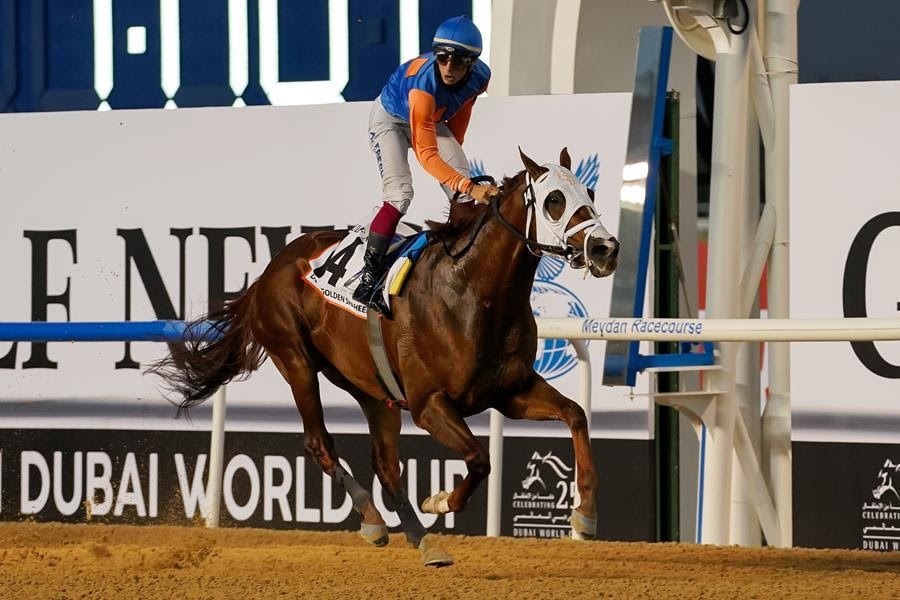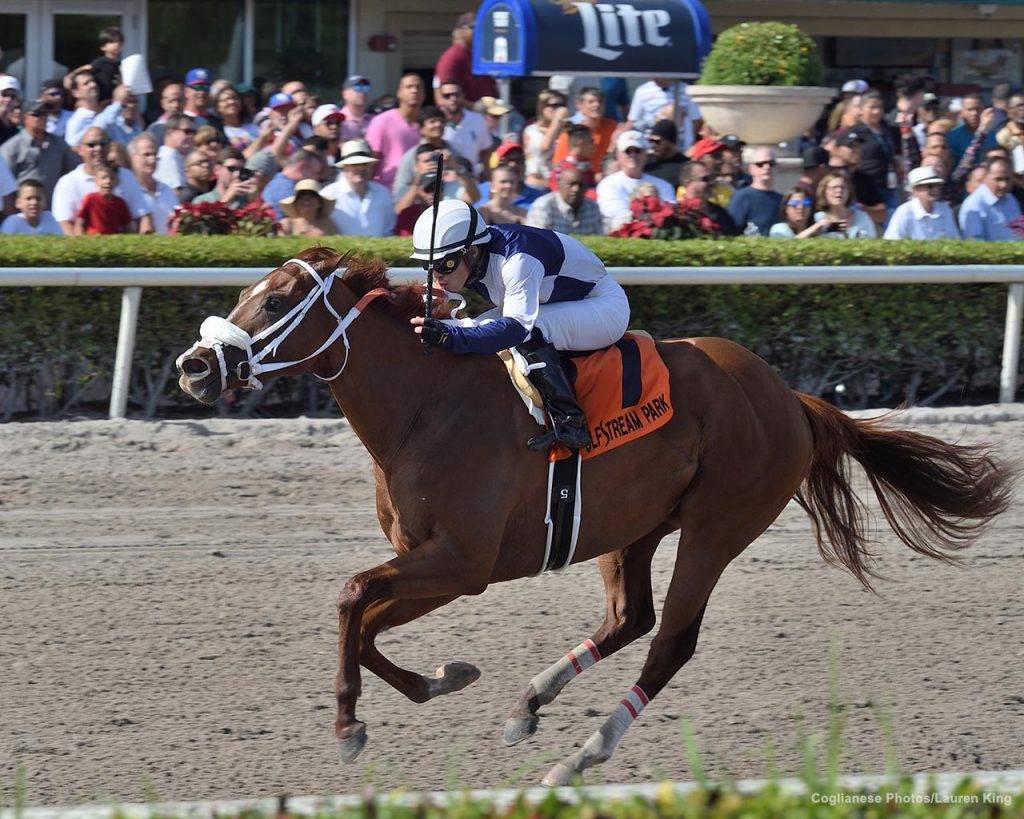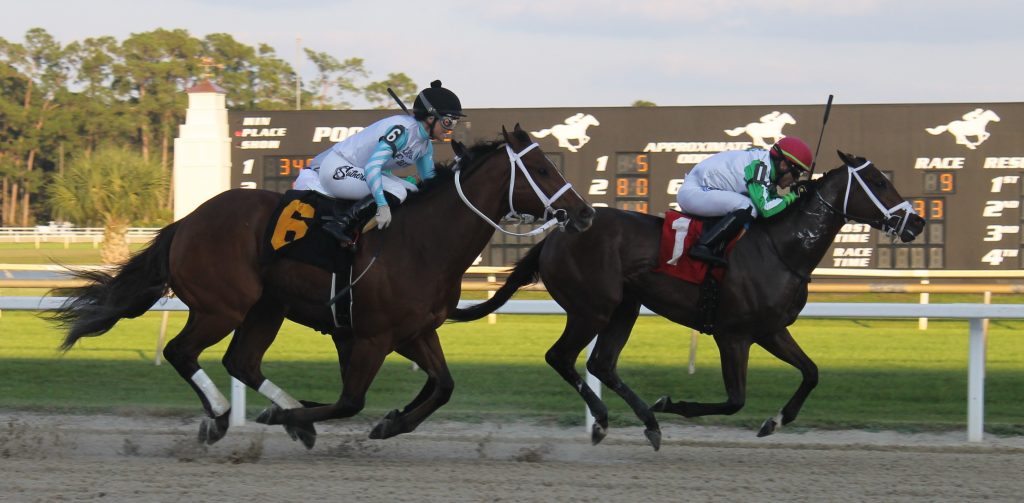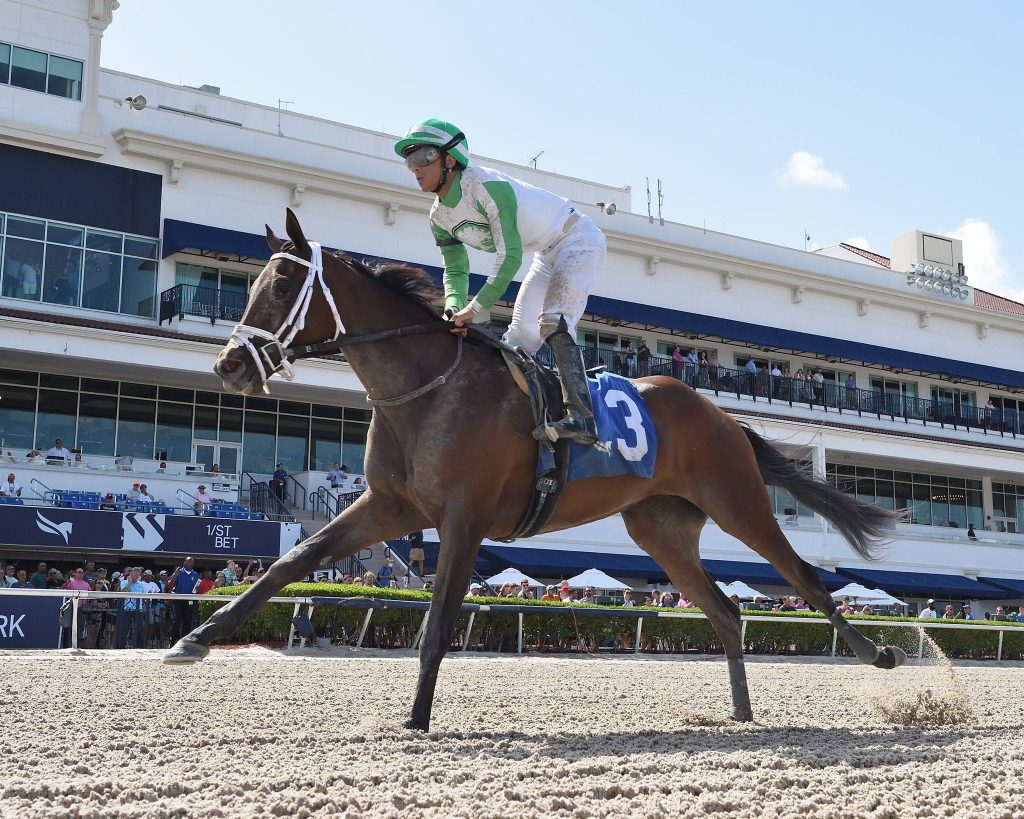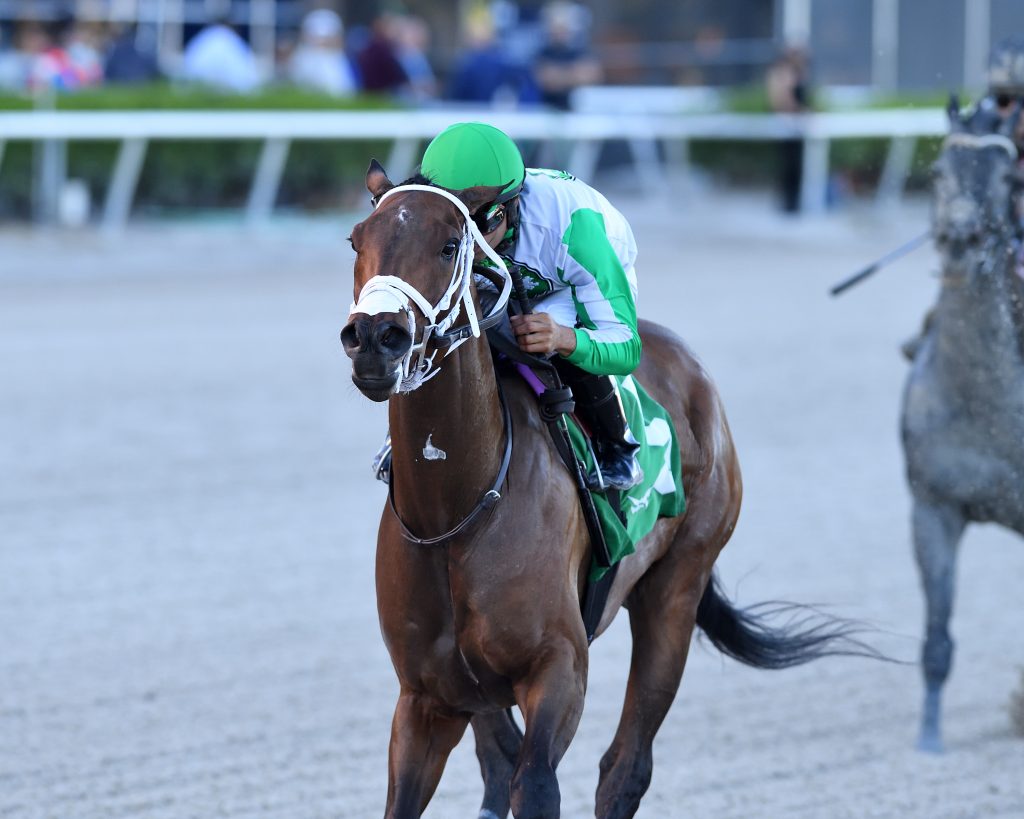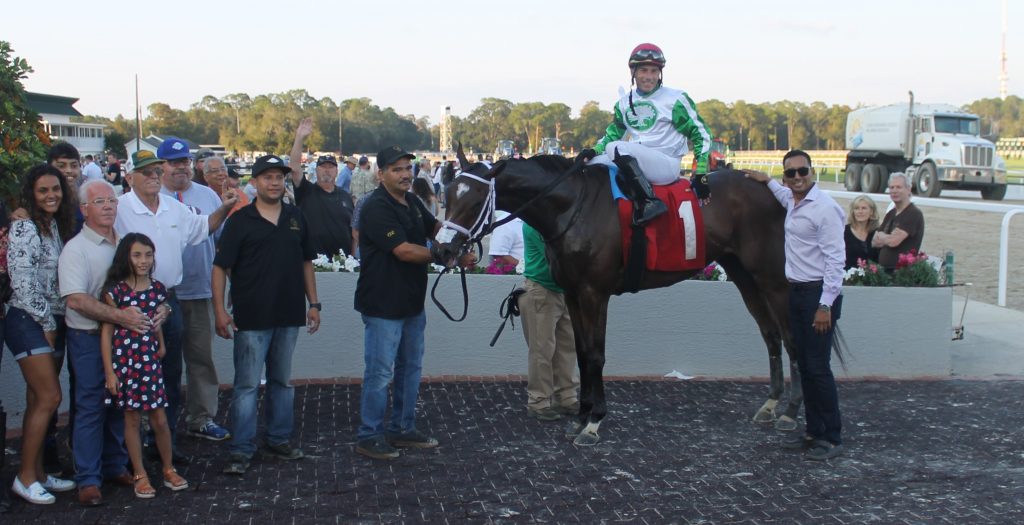
Carlos David (far right) in the winner’s circle with Octane after the FTBOA Marion County Florida Sire Stakes (Ben Baugh)
By Ben Baugh
Most 15-year-olds haven’t defined their career goals, let alone find themselves having the courage to leave their native country to pursue their dreams.
Thoroughbred trainer Carlos David took that leap of faith as a teenager to leave Cali, Colombia and relocate to the United States and direct his energies to the sport he loved that would become his destiny.
“I was still in high school, at home; I had little free time and would spend it around the horses on the weekends,” said David. “I was going outside of the city to ride a few horses with my uncle.”
David’s family had a background in the sport, spurring his interest in Thoroughbred racing, laying the foundation for what would become his passion and vocation.
“My mom’s side of the family had a couple of jockeys that raced in Colombia for a few years before coming to the States,” said David. “We were always kind of involved with the sport.”
Going to work for the man from Mobridge
The future Thoroughbred trainer found himself learning from the ground up in the barn of Hall of Fame trainer Bill Mott, in 2001.
“I was around 16, and I was able to hotwalk for Billy,” said David. “My uncle was an exercise rider there. He was very close to Billy Mott. He would come to the family parties and get togethers. He was really good to us, and to be able to learn from him was a good experience, from being a hotwalker, all the way to being a foreman and exercise rider. It’s kind of like my base for who I am right now.”
The chance to work for Mott provided David with other opportunities, including being around horsemen with outstanding reputations. One of those was seven-time Eclipse Award winning jockey and Hall of Fame rider Jerry Bailey.
“Jerry was around a lot to breeze horses for Billy,” said David. “I’ve been interviewed a couple of times by Jerry (who is now a broadcaster), and this is a guy who I used to see ride the best horses for Billy Mott back in the day, and we would reminisce about it. It was cool to see a little bit of history. Jerry Bailey was Cigar’s rider, a talented horseman and good person. I was always surrounded by good people, good horsemen from Billy Mott to Wayne Lukas. I worked for different trainers over the years.”
Southern charm
After working in other roles while in Mott’s barn, David would make the transition to becoming an exercise rider and found himself leaving the backside of the racetrack for the charm of a small southern city to work on honing his skills.
“My uncle was really good friends with Tim Jones (a former assistant to Mott, who was working as the trainer for Robert and Janice McNair’s Stonerside Stable, (whose training operation was based at the Aiken Training Track in Aiken, S.C.), but he had left Billy to do his own thing at the farm with Stonerside, and Billy asked him if he could teach me to ride,” said David. “I helped him at the farm, and it worked out really well. I was there for about six months, learning how to break babies and helping him out. He became family. He’s a family man…I love his family. I’m grateful he was the one who taught me how to ride.”
Moving on up
The experiences in Mott’s barn would have a profound effect on David, and he would continue his evolution as a horseman going to work for several other trainers, one of them being another former Mott assistant, Seth Benzel.
“Seth went out on his own after being with Todd Pletcher for a few years,” said David. “He was around English Channel, Rags to Riches and a lot of nice horses, when Pletcher was booming. I was riding for a lot of people, just trying to get some experience, Rick Violette, Richard Dutrow, George Weaver, D. Wayne Lukas and then I ended up calling Seth. I wanted to see if he needed help as an assistant.”
Benzel’s impact on David’s career continues to resonate with the conditioner, long after his departure from the trainer’s operation.
“I knew Seth for years, since I had first come to the United States,” said David “He speaks fluent Spanish and taught me a lot of English. We have a friendship. I ended up working for him for three years. I was an assistant (trainer). It was good while it lasted. He ended up retiring from being a trainer shortly after I left. He does a lot of other things. He’s an artist. We stay in touch. When I went to Dubai, I saw him. He reached out and congratulated me.”
Continuing education
David continued his progression, moving on to the barn of Jason Servis, where he spent nearly four years as an assistant, continuing to learn and refine his skills before making the decision to go out on his own, taking out his trainer’s license by the end of 2017.
“When I started with Jason, he had maybe 20 head of horses at Palm Meadows and maybe 10 or 15 in New York, so he wasn’t really that big,” said David. “I was at Palm Meadows. I would go to New Jersey in the summer and go to Florida in the winter.”
Making that fateful step
The opportunity to go out on his own presented David with a series of challenges, something he readily embraces. However, it gave him the chance to pursue his goals while placing an emphasis on work-life balance.
“I’m never satisfied with what I have, I always want more,” said David. “I’m never content. I always want to do more. It was a goal that I had. Jason told me that it wasn’t easy being a trainer. He didn’t want me to quit. I was like, ‘No, I gave it plenty of time.’ When we left New Jersey and returned to Palm Meadows that year, I told him I would be staying in Florida. I didn’t want to travel anymore. I wanted to buy a house, a little townhouse or something with my wife, and try to start my own thing. I had one horse with a friend. I just wanted to try; I’m never going to know if I don’t try.”
The transition to hanging his own shingle outside of his barn, wasn’t necessarily met with great enthusiasm, particularly by his previous employer, something that’s endemic to a profession that’s renowned for its fiercely determined and competitive nature.
“Jay was a little bit upset about it (when I left),” said David. “He didn’t want me to leave. He wasn’t that happy. It’s not like he helped me in any way. He’s like ‘Good luck, you’re on your own.’ Any time there’s another trainer out there, that means there’s more competition for you. Very rarely, are you going to see trainers helping each other when they start. I didn’t care, I learned over the years not only from Jason but from different trainers. Jason was a talented trainer.”
David learned a critical part of the game while working for other conditioners, allowing him to refine his skills as an assistant trainer, providing him with great insight and a toolbox of resources, one in particular that’s helped him since deciding to go out on his own.
“Claiming horses was a big part of me becoming a trainer,” said David. “When you don’t have big owners who just give you horses and feed you horses, you have to claim and that’s how I started. In that way, I learned a lot from Jason. He was a big claimer. He taught me a lot about how to manage the horses that you claim and how to get them back into good form. I did learn a lot from that.
“Other than that, I just started doing my own thing, implementing things from other trainers, not just Jason Servis.”
His former boss has recently been making headlines, in a less than favorable nature, after pleading guilty for his actions that he acquired, distributed and directed others to administer performance-enhancing drugs, casting a pall on the sport.
“I never knew the relationship Jason had with other people,” said David. “He was a very private person. He never shared anything outside of work. We never hung out. I was just doing my job as an assistant trainer. A lot of people see me, and I’m like guilty by association. It was another job for me. I just happened to be there, and left way before it happened. I’m kind of glad that I made the move when I did, otherwise it would’ve been a different story for me.”
Connections and results
However, David has enjoyed success since starting his own stable, with a number of owners including Arindel, Palm Beach Racing V LLC, Lawrence and Michele Sargent, Twin Sports Racing and Shea D Boy’s Stable are among those who’ve supported the conditioner with runners over the past five years.
“I’m just blessed to have the people that I have at the moment,” said David. “I feel like I’ve done well, and I try to stay in the mix of the good trainers and the stats. I never get comfortable. Every day, I try to do better and better, so I can be relevant, and that’s the only way you can get horses and clients. If you’re not out there winning races, they don’t see you. The next thing you know, you have a handful of horses. You just have to keep grinding.”
Triumph and tragedy
The most successful runner in terms of earnings and generating exposure on the international stage for David was a chestnut son of Fed Biz. Zenden demonstrated his precocity as a juvenile in winning the Buffalo Man Stakes at Gulfstream Park, while in the barn of Victor Barboza, Jr. His sophomore campaign included a second-place finish in the Grade Three Swale Stakes and a fourth-place effort in the Lambholm South Tampa Bay Derby (Gr. 2). Zenden returned to the races with a new owner and was now in the barn of Hall of Fame trainer Todd Pletcher, after a 7-month layoff. His debut for his new connections were a winning one in a 6-furlong allowance contest at Gulfstream Park West.
Zenden’s fortunes would change after his fourth start while in Pletcher’s charge in the Grade Two Gulfstream Park Mile Stakes during his 4-year-old campaign, and once again he would find himself taking a respite from the races, with another 7-month layoff.
“LLP Performance Horses had given me a filly earlier that year, and I did okay with her, winning some races,” said David. “The horse (Zenden) got hurt in the gate in a race with Pletcher. I guess he kicked the gate with his hind leg, and he had a high-suspensory injury. He sent the horse to Rood and Riddle. The owner asked me to call and to call and figure out what was happening. I was like, ‘it’s not my place.’ I didn’t have the horse. Pletcher had the horse; he just wanted to make sure. He’s a Spanish speaking person, the owner. He asked me to call Rood and Riddle on his behalf, find out what was going on, is the horse okay, what’s going to happen with the procedure and is the prognosis good.”
One of the surgeons told David that they were going to do some therapy and injections in the high-suspensory.
“They were going to send him to the farm for four or five months,” said David. “I relayed the message to the owner. He was happy. He was like, ‘no problem, thank you.’ The horse went to the farm. Several months later, he tells me, ‘Remember that horse where you talked to the vet for me, he’s coming to you in a month. He’s not going back to Pletcher.’”
David was thrilled with the possibilities, looking at the stakes winner’s previous form and recognizing Zenden’s inherent talent. He also had his work cut out for him, having to adapt the son of Fed Biz to his training program and getting him back to the races.
The owner was adamant that if David observed any problems with the horse, to let him know, and it would be addressed immediately.
“Every week, I would check the horse with the vet, check his hind end,” said David. “I didn’t see anything. I’d check in with my vet, and would ask if he picked up anything, and he said, ‘there’s nothing wrong with the horse.’ They told us to give him a weekly Adequan shot, and to keep him happy and sound as possible.”
The resilient runner, was on his way to recovery, when he exhibited signs of another problem, one that was far removed from his previous malady.
“He had an eye issue, I thought it was an ulcer, and after digging deeper into the problem, we found out he had a cancerous mass in his eye, like a tumor,” said David. “We called Rood and Riddle, and they did surgery on the eye and took the tumor out. It had been bothering him. After the tumor was removed, he was a different horse. He began training really well.”
Zenden won his first time out after the more than 7-month layoff, capturing a 6-furlong allowance contest by a neck at Laurel Park on Oct. 9, 2020. However, it appeared he was taking a step backward in his next two starts, in the Frank Whiteley Stakes at Laurel and the 7-furlong Mr. Prospector Stakes (Gr. 3) at Gulfstream Park in latter part of autumn, that had some critics scratching their heads, but David had confidence in his charge.
“We ran him in the Mr. Prospector, which I didn’t think was his distance at all,” said David. “The race was 7/8ths and a Grade Three. I didn’t want to run him, but the owner wanted to try him there. He thought the horse would go long, and he thought the same thing when the horse was with Pletcher. That wasn’t the case. He (Zenden) was really fast. He’s going to go to the lead, and he gets tired.”
David mapped out Zenden’s next race, and it was about finding the right spot for the horse, so he could return to his winning form. A trainer is also faced with placating the owners wishes, and diplomacy, understanding and compliance are among the responsibilities that go along with the vocation.
“When you talk to owners, you try to make them as happy as you can,” said David.
A return to Tampa Bay Downs would be propitious for Zenden, placing second in his 5-year-old debut in Oldsmar. But it would be his next start that Zenden would make a powerful impression winning the 6-furlong Pelican Stakes at Tampa Bay Downs with the incomparable Samy Camacho in the irons, with the victory serving as a harbinger, one that would transform David’s life.
Zenden’s next start would be in a place that seemed a world away, and even after his victory in the Pelican, it didn’t seem plausible. But fate and the vagaries of life were about to intervene, creating a rare opportunity, one that wasn’t even on David’s radar.
“After he won (the Pelican), one of the owner’s goals was to point him toward going to Dubai,” said David. “I was like ‘He has to be crazy.’ I’m like. ‘We’ll see what happens in the Pelican.’ And when he won the Pelican, I was happy.”
But there was some concern on the part of the connections, one whether or not their nomination would be accepted because the deadline had already passed.
“I talked to a couple of people because I didn’t know anything about going to the World Cup,” said David. “It was something that had never crossed my mind. I talked to Chad Summers and a few people, and they knew the procedure of what needed to be done. They kind of guided me and our nomination was accepted. He would have to finish eighth to make $20,000, which the was the amount of money the owner spent to enter him into the race. I knew he wasn’t going to finish eighth. He was better than that.”
Things with Zenden couldn’t have been more seamless, he shipped well and trained well over the track. Everything seemed to be falling into place before the big race.
“He blossomed when he was there,” said David. “He loved the track. The vets come in and check the horses on a regular basis. They come like five times before a race. They said, ‘we haven’t seen a horse this good in a while.’ They kept saying the same thing.”
It appeared that Zenden was primed and ready for the biggest race of his life. His connections, the veterinarians and other horsemen could see the 5-year-old horse seemed poised for an outstanding performance. Only the bettors seemed to dismiss the son of Fed Biz, who was sent off at odds of 53-1. It seemed like all signs were pointing toward success.
“I loved him,” said David. “I loved the way he was going. I loved the way he was traveling. He was eating everything. I had a good feeling about it. Chad Summers, who had Mind Your Biscuits, saw Zenden and said, ‘the last horse that gave me this feeling, was my horse.’ And he won the race twice (with Mind Your Biscuits). Chad was kind of like an ambassador for the American people going there. He was always helping me and (Jose Francisco) D’Angelo.”
When the race began unfolding and Zenden forged his way to the front, David was in a state of disbelief, and then was overcome with joy. The horse had established a new track record at Meydan Racecourse, capturing the the Dubai Golden Shaheen sponsored by Gulf News (Gr. 1). However, within seconds the feeling of elation was replaced with an overwhelming sense of sadness as after Zenden crossed the wire, he sustained an injury breaking his left front leg, hurling jockey Antonio Fresu to the ground. The crestfallen connections were heartbroken.
“I had everything set up for the horse to come back to the farm in Kentucky,” said David. “I had called Taylor Made to set everything up for the horse to come back and spend some time at the farm, no matter the outcome of the race. It hurt me as a person, hurt my barn, we all loved him and were really excited about the race. It’s just not the way you want to win a Grade One…he was my first Grade One winner. I have pictures of him all over my office. He’ll always be the best horse I’ve had.”
Roster replete with talent
Alan Cohen’s Arindel Farm’s homebred Octane, a son of Brethren, out of the Aldebaran mare Star Recruit, was the recent winner of the FTBOA Marion County Sire Stakes at Tampa Bay Downs; and has been a consistent performer. He won three consecutive races as a juvenile including back-to-back scores in the FTBOA Florida Sire Affirmed Stakes and the FTBOA Florida In Reality Sire Stakes.
“I’m so grateful that I linked up with Arindel,” said David. “The last two years, we’ve been very fortunate to have winners in the Florida Sire Stakes, in both the female and male divisions. I was thrilled to be able to get the job done for these guys (Arindel). It’s kept us in business for two years now. It’s really special that way. He made that happen for me. We gave him some time off, and we were pointing him toward the Breeders’ Cup after he won the In Reality division. I talked to the owner and decided to give him some time off. We thought that the horse wasn’t going to be able to handle going out to California after running in all those races. We would rather just try to save him and try to do good during his 3-year-old campaign.
That decision has been paying dividends, and his win in the Marion County suggests there are bigger things on the horizon for Octane. The 2023 racing calendar should be no different for the bay gelding.
“We just kind of spot him, put him in the right spot, and try to manage him well,” said David. “I get together with Brian (Cohen, Arindel) and try to map it out, where he’s just going to keep going forward…keep winning races with him and go in the right direction. The good thing about him, is that he can go both short and long. We’ll try to stretch him out again, that will be the next step, go a mile. He loves going 7/8ths.”
Lynx, another Arindel homebred has also enjoyed a substantial amount of success for her connections. The 3-year-old daughter of Brethren, out of the Red Bullet broodmare Darby Rose, won the FTBOA Susan’s Girl Stakes last summer at Gulfstream Park during her juvenile campaign.
“She almost got all three races under her belt, and she came up a little short the last time (FTBOA Florida Sire My Dear Girl Stakes, finishing second),” said David. “It was her first time going two turns, there were some nice fillies in that last leg, and going two turns was too demanding for her and she got a little tired. After that race we decided to give her some time off, just take it easy so she could come back in January (Lynx placed third in the Cash Run Stakes New Year’s Day at Gulfstream Park) as a 3-year-old. There are a couple of races we’re looking to run her back in, with a little bit of time and a little bit of a breather, she’s training well and I’m really happy with her right now.”
Palm Beach Racing V’s Hot Blooded is a horse David has an affinity for, the 5-year-old son of Declaration of War has a couple of stakes wins to his credit, the Proud Man Stakes during his juvenile campaign and the Soldier’s Dancer Stakes an added money race he captured during his 4-year-old campaign.
“He’s nice and I love him,” said David. “We want to get him on the grass course again. He’s training well and he’s matured. We decided to geld him, and it’s turned him around for the better. He’s doing great.”
Another stakes winner conditioned by David is Legal Deal, a son of Khozan out of the Wildcat Heir mare Legal Laura, won the Millions Sprint Preview at Gulfstream Park West on Nov. 14, 2020, during his sophomore campaign. Legal Deal races in the silks of Michele and Lawrence Sargent. Legal Deal will go postward January 14, 2023 at Gulfstream Park in the Sunshine Sprint Stakes.
“All of these horses, I like to give them time off,” said David. “I think it’s important. They give you all the races you want. You put them in spots, and they run so well. It’s important to give them a few months off and let them be a horse. They’re grateful when then come back and they’ll perform better. Legal Deal has been at the farm for the past two months. He’s getting ready to come back and to start working again. I love him. I claimed him for $12,500. He’s been one of the best claims I’ve made, if not the best one. He’s on the top of my roster right now. He’s really fast. He’s one of my babies, they all are.”
Another Arindel homebred that bears watching in 2023 is Octane’s older full-brother, the bay gelding Gatsby, who placed third in the FTBOA Marion County Florida Sire Stakes. The son of Brethren won his first time out on April 12, 2020, and won the Sunshine Sprint Stakes on Jan. 15, 2022. Gatsby will attempt to defend his title in the Sunshine Sprint Stakes on Jan. 14, 2023 at Gulfstream Park.
“I discuss everything with Brian (Cohen), where to go and we sit down and talk about the horses that they have here with me, and Gatsby’s always been a great part of that group and discussion, because of how well we’ve done with them. He’s very similar to Octane, in the way they act and the way they run. Gatsby likes to sit off the lead a little. Chantal (Sutherland) does a great job riding him, and unfortunately that day she couldn’t ride him (she rode Lea Farm’s Willy Boi, who was second to Octane in the Marion County). They have some great jockeys at Tampa and he’s not that difficult to ride, it’s just placing hm the right way. It was a good race, it was those three horses down to the wire (Octane, Willy Boi and Gatsby). I was really happy with the outcome.”
A team effort
One component to David’s success is his team at the barn, who work hard to make sure the horses are happy, stay sound and are ready to compete.
“We don’t have a lot of horses, but it’s quality versus quantity,” said David. “I could have 100 horses or 20 horses, and I’m going to try to do the same for all of them, be here, grind and take care of them.”
Goals and aspirations
David would love to be able to expand his operation, with the opportunity to have different divisions at some of the premier tracks nationwide. His desire to excel is palpable.
“I can always use more clients, I’m happy with the clients I have,” said David. “If I’m going to be a big trainer, I’m going to need those big clients. I hope they notice. I’m going to continue working hard with my team and trust the way my clients trust me. I’d like to become like Pletcher, Asmussen and Brad Cox. Everybody deserves a chance. The results speak for themselves. I invite anyone, who has any doubt to come to my barn and spend a day or two there and see how we do things. I want to be one of the best and having more horses, and having horses at the big tracks like Churchill Downs, Keeneland and Saratoga. That’s one of the main goals.”



